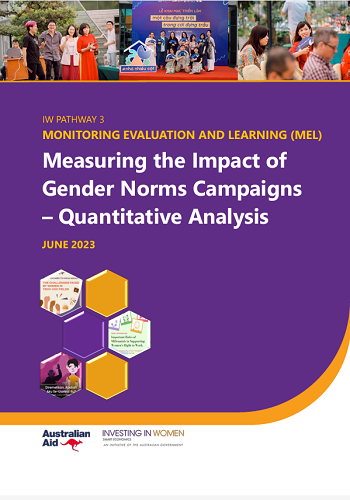Measuring the Impact of Gender Norms Campaigns in South East Asia – Quantitative Analysis
Summary
This report provides a quantitative analysis of the impact of IW gender norms campaigns, targeting urban millennials in Indonesia, the Philippines and Vietnam. It investigates shifts in attitudes toward four key gender norms affecting women’s economic opportunities which are:
- Norm 1 – Caregiving: Women’s primary role is perceived as carer for children and family members
- Norm 2 – Breadwinning: Men’s perceived role as primary income earner/provider for the
Family - Norm 3 – Job Segregation: Perceptions that certain job types are specific to women and
others to men - Norm 4 – Leadership: Perceptions of women as better in supportive roles and men as better leaders.
To measure the impact of gender norms campaign material on attitudes and behaviour change, IW established an innovative approach. This is composed of measuring population-level change through the Social Norms, Attitudes, and Practices (SNAP) surveys, campaign-level change through partner campaign data, and panel-level change through Insights Panel (established on Facebook) of 400-500 urban millennials in each country.
The results revealed positive shifts in attitudes towards job segregation, leadership roles, childcare responsibilities, and breadwinning norms, indicating the success of the campaigns in challenging traditional perspectives.
Highlights
- The campaigns achieved positive shifts in perceptions on job segregation and breadwinning, highlighting the effectiveness of targeting commonly held gender norms.
- Insights Panel results showed positive trends in job segregation, with Indonesia and the Philippines showing the most significant shifts towards progressive views.
- Recommendations stress the importance of identifying and supporting selected partner campaigns for future measurements and advocating a two-layer approach for more focused campaign evaluations.


